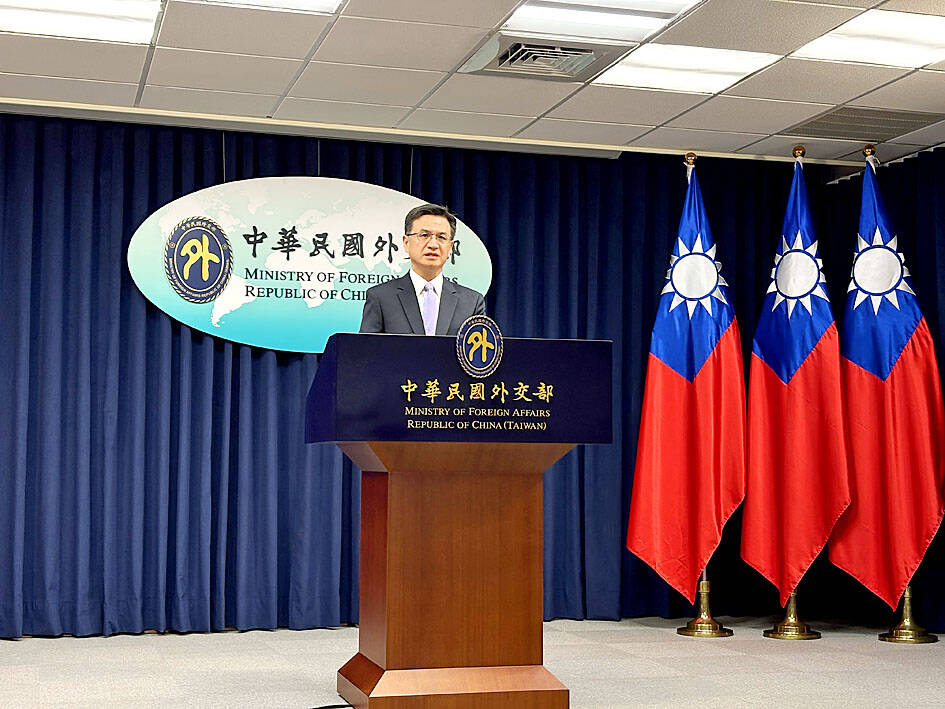The Taiwan Strait is international waters, not China’s “inland waters” as it claims, the Ministry of Foreign Affairs (MOFA) said yesterday, as expressed gratitude to like-minded countries for voicing concern about China’s military exercise around Taiwan on Monday.
The Chinese People’s Liberation Army (PLA) on Monday launched military drills, called “Joint Sword-2024B,” in the Taiwan Strait and surrounding Taiwan, which it said served as “a stern warning to the separatist acts of Taiwanese independence forces.”
The one-day joint drills came four days after President William Lai (賴清德) reiterated that the Republic of China and the People’s Republic of China are “not subordinate” to each other, in his first Double Ten National Day address.

Photo: Huang Chin-hsuan, Taipei Times
The MOFA strongly condemns the PLA’s drills, ministry spokesman Jeff Liu (劉永健) said.
“The Taiwan Strait is international waters, not inland waters as China claims,” he said, adding that Taiwan is not only in the center of the first island chain, but also plays a crucial role in the “non-red supply chain” and democratic global value chain.
“Maintaining freedom, openness and peace in the Taiwan Strait and the Indo-Pacific region is already an international consensus,” he said.
The ministry also expresses its regards and sincere gratitude to like-minded countries for expressing serious concerns shortly after China launched its military drills, and for reiterating their opposition to unilateral actions to change the “status quo” in the Strait, and urging China to show restraint, he said.
The US Department of State said the US is “seriously concerned” about the PLA’s “unwarranted” and “provocative” drills, while Japanese Prime Minister Shigeru Ishiba and the Japanese ministers of foreign affairs and defense also stressed the importance of peace in the Strait.
The EU warned against “unilateral actions” that change the “status quo” in the waterway.
The UK said it was concerned by China’s military exercises around Taiwan as they increased tensions and risked a “dangerous escalation” in the Strait.
“We do not support any unilateral attempts to change the status quo... We call for restraint and the avoidance of any further actions that may undermine peace and stability,” the British Foreign, Commonwealth and Development Office said in a statement.
Shortly after announcing the completion of the drills on Monday, the Chinese Ministry of National Defense issued a statement saying the exercise was an increase in pressure against Taiwanese independence, and that more could follow.
The Pentagon strongly criticized the Chinese military’s war games, calling them destabilizing.
“This military pressure operation is irresponsible, disproportionate and destabilizing,” Pentagon spokesman Major General Patrick Ryder said in a statement.
Japan yesterday expressed its “concerns” to China over the drills, adding that it scrambled fighter jets near its southern island of Yonaguni.
“The government is closely monitoring the related activities with great interest, and has conveyed Japan’s concerns to the Chinese side,” Japanese Deputy Chief Cabinet Secretary Kazuhiko Aoki told reporters.
Additional reporting by Reuters and AFP

‘DENIAL DEFENSE’: The US would increase its military presence with uncrewed ships, and submarines, while boosting defense in the Indo-Pacific, a Pete Hegseth memo said The US is reorienting its military strategy to focus primarily on deterring a potential Chinese invasion of Taiwan, a memo signed by US Secretary of Defense Pete Hegseth showed. The memo also called on Taiwan to increase its defense spending. The document, known as the “Interim National Defense Strategic Guidance,” was distributed this month and detailed the national defense plans of US President Donald Trump’s administration, an article in the Washington Post said on Saturday. It outlines how the US can prepare for a potential war with China and defend itself from threats in the “near abroad,” including Greenland and the Panama

The Chinese Nationalist Party (KMT) is maintaining close ties with Beijing, the Democratic Progressive Party (DPP) said yesterday, hours after a new round of Chinese military drills in the Taiwan Strait began. Political parties in a democracy have a responsibility to be loyal to the nation and defend its sovereignty, DPP spokesman Justin Wu (吳崢) told a news conference in Taipei. His comments came hours after Beijing announced via Chinese state media that the Chinese People’s Liberation Army’s Eastern Theater Command was holding large-scale drills simulating a multi-pronged attack on Taiwan. Contrary to the KMT’s claims that it is staunchly anti-communist, KMT Deputy

RESPONSE: The government would investigate incidents of Taiwanese entertainers in China promoting CCP propaganda online in contravention of the law, the source said Taiwanese entertainers living in China who are found to have contravened cross-strait regulations or collaborated with the Chinese Communist Party (CCP) could be subject to fines, a source said on Sunday. Several Taiwanese entertainers have posted on the social media platform Sina Weibo saying that Taiwan “must be returned” to China, and sharing news articles from Chinese state media. In response, the Mainland Affairs Council (MAC) has asked the Ministry of Culture to investigate whether the entertainers had contravened any laws, and asked for them to be questioned upon their return to Taiwan, an official familiar with the matter said. To curb repeated

Myanmar has turned down an offer of assistance from Taiwanese search-and-rescue teams after a magnitude 7.7 earthquake struck the nation on Friday last week, saying other international aid is sufficient, the National Fire Agency said yesterday. More than 1,700 have been killed and 3,400 injured in the quake that struck near the central Myanmar city of Mandalay early on Friday afternoon, followed minutes later by a magnitude 6.7 aftershock. Worldwide, 13 international search-and-rescue teams have been deployed, with another 13 teams mobilizing, the agency said. Taiwan’s search-and-rescue teams were on standby, but have since been told to stand down, as